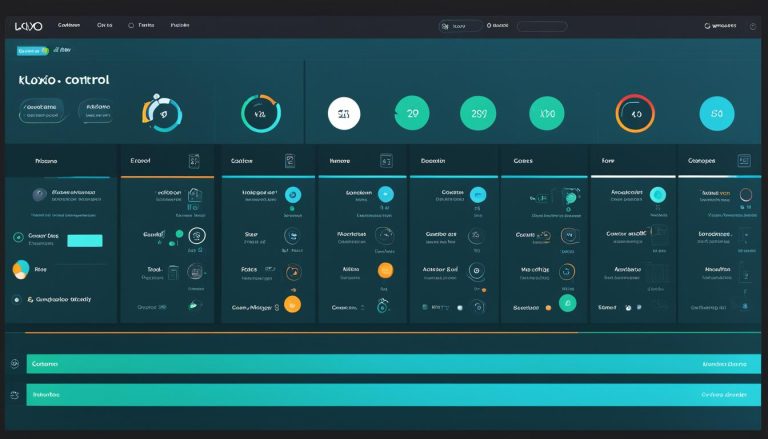Unraveling the Basics: What is C in Programming Language
Welcome to my C language tutorial! In this article, I will provide you with a comprehensive introduction to the C programming language. Whether you are a beginner or have some programming experience, understanding the basics of C is essential for your journey into the world of software development. So, let’s dive in and unravel the mysteries of C!
Key Takeaways:
- The C programming language is a widely used and powerful language developed by Dennis Ritchie.
- C is a high-level programming language known for its simplicity, portability, and performance.
- It is used in various applications, including operating systems, embedded systems, and gaming software.
- Learning C serves as a foundation for learning other programming languages.
- C allows for efficient program development and supports file input/output operations.
Basic Concepts of C Programming
When it comes to learning the basics of the C programming language, there are a few key concepts that you need to understand. First and foremost, C is a general-purpose programming language that is designed to be easy to read and write. This makes it an ideal choice for beginners who are just getting started with programming.
In terms of syntax, C follows a structured approach. This means that code is written in a text editor and then compiled using a compiler. Variables are used to store data, and mathematical operations are performed using operators. Control structures, such as if-else statements and loops, are used to control the flow of the program. Additionally, functions are used to perform specific tasks and can be called from other parts of the program.
By understanding these basic concepts of C programming, you’ll have a solid foundation to build upon as you continue to learn and develop your skills. Whether you’re interested in creating operating systems, embedded systems, or gaming software, mastering the basic concepts of C language will set you on the right path.
To further illustrate these concepts, let’s take a look at a table that highlights some of the key features of the C programming language:
| Feature | Description |
|---|---|
| Compiled Language | C code is compiled into machine code before execution |
| Structured Syntax | Code is written in a structured manner using variables, operators, and control structures |
| Variable Storage | Data is stored in variables, which can be of different types such as integers and characters |
| Function-based Approach | Tasks are performed using functions that can be called from different parts of the program |
By familiarizing yourself with these basic concepts and features, you’ll be well-equipped to start your journey into the world of C programming.
Why Learn C Programming Language?
The C programming language is widely regarded as one of the most important languages for aspiring programmers to learn. It offers a range of benefits that make it a valuable skill to have in the tech industry.
One of the key reasons to learn C is its versatility. It is used in the development of various applications, including operating systems, embedded systems, and gaming software. By learning C, you gain the ability to work on projects in these high-demand fields, opening up numerous career opportunities.
Another advantage of learning C is its simplicity. Despite being a high-level language, C is known for its clear syntax and straightforward structure. This makes it easier to read and understand, making the learning process more accessible for beginners.
Furthermore, learning C serves as a solid foundation for mastering other programming languages. Many popular languages, such as C++, Java, and Python, are based on C or heavily influenced by it. By familiarizing yourself with C, you’ll have a smooth transition to these languages and a deeper understanding of programming concepts.
In conclusion, learning the C programming language provides numerous benefits. Its versatility, simplicity, and influence on other languages make it an invaluable skill for anyone interested in the world of programming.
Table: Benefits of Learning C Programming Language
| Benefit | Description |
|---|---|
| Better career prospects | Opportunities in high-demand fields like software development, embedded systems, and gaming |
| Easier to learn and understand | Clear syntax and straightforward structure |
| Foundation for learning other languages | Many popular languages are based on or influenced by C |
Features of C Programming Language
The C programming language offers a range of features that contribute to its popularity and versatility. Understanding these features is essential for mastering C and harnessing its power in software development.
Variables
In C, variables are used to store and manipulate data. They can hold various types of data such as integers, floating-point numbers, and characters. With variables, you can perform mathematical operations, make comparisons, and store input from users.
Functions
Functions in C allow you to break down complex tasks into smaller, more manageable parts. You can define your own functions to perform specific actions and call them whenever needed. Functions enhance code organization, reusability, and overall program efficiency.
Control Structures
C provides control structures like if-else statements, loops, and switch statements to control the flow of a program. These structures allow you to make decisions, repeat tasks, and handle different scenarios based on specific conditions, making your programs flexible and responsive.
Pointers
Pointers are a powerful feature in C that allow you to manipulate memory directly. They enable you to work with addresses and access the value stored at a specific memory location. Pointers are widely used for efficient memory management, dynamic memory allocation, and data structures.
Arrays and Strings
C supports arrays, which are collections of elements of the same data type, and strings, which are arrays of characters. Arrays and strings are essential for storing and manipulating multiple values simultaneously, allowing you to handle complex data structures and perform operations efficiently.
These are just a few of the many features that make C programming language a flexible, powerful, and widely used language in the field of software development.
Applications of C Programming Language
The C programming language is widely used in various applications across different industries. Its versatility and efficiency make it a popular choice for developers. Let’s explore some of the key areas where C is utilized:
Operating Systems
C is extensively used in the development of operating systems like Windows, Linux, and macOS. These operating systems require low-level programming capabilities, making C the ideal language for creating efficient and reliable system software.
Embedded Systems
Embedded systems, found in devices such as microcontrollers and IoT devices, often rely on C programming. C provides direct hardware access and efficient memory management, making it suitable for embedded systems where resources are limited.
Gaming Software
C programming language is also widely used in the development of gaming software, including game engines and frameworks. Its speed and control over memory allow developers to create complex and high-performance games.
Table: Applications of C Programming Language
| Industry | Applications |
|---|---|
| Operating Systems | Windows, Linux, macOS |
| Embedded Systems | Microcontrollers, IoT devices |
| Gaming | Game engines, frameworks |
These are just a few examples of the wide range of applications where C programming language is utilized. Its simplicity, portability, and power make it a valuable tool for developers across various industries.
Importance of C Programming Language
The C programming language holds immense importance in the world of programming. It is widely regarded as one of the foundational languages and serves as a stepping stone for programmers to enhance their skills and knowledge. Learning C is crucial for several reasons, making it a must-know language for aspiring developers and seasoned professionals alike.
Firstly, the simplicity of C makes it an ideal language for beginners. Its clear syntax and straightforward rules make it easier to grasp the fundamental concepts of programming. By starting with C, learners can build a solid foundation and gain a deeper understanding of programming principles.
Secondly, the versatility of C programming language makes it essential in various fields. It is extensively used in operating system development, embedded systems programming, and game development. By learning C, programmers gain access to high-demand career opportunities in these industries.
Lastly, learning C programming language opens doors to mastering other programming languages. Many popular languages, such as C++, Java, and Python, have borrowed concepts and syntax from C. This means that by learning C, developers can seamlessly transition to these languages and expand their skill set.
Table: Comparing key features of C programming language
| Feature | Description |
|---|---|
| Portability | C programs can run on different hardware platforms without modifications, making it highly portable. |
| Efficiency | C is a compiled language, resulting in fast execution and efficient memory management. |
| Low-level control | With C, developers have direct access to memory and hardware, allowing for fine-grained control over system resources. |
| Wide range of applications | C is used in various domains, including system programming, embedded systems, game development, and scientific computing. |
| Fundamental concepts | Learning C helps in understanding core programming concepts like variables, functions, control structures, and memory management. |
“C is a powerful language that lays the foundation for building robust software systems. Its simplicity, versatility, and low-level control make it an essential language for every programmer’s toolkit.”
How C Programming Language Works
Understanding how C programming language works is essential for anyone learning this versatile programming language. C follows a structured approach, where code is written in a text editor and then compiled into machine code using a compiler. Let’s explore some key concepts and principles of C programming.
Variables and Data Types
In C, variables are used to store and manipulate data. Each variable has a specific data type, such as integers, floating-point numbers, characters, or user-defined types like structures. Data types determine the size and behavior of variables.
Operators and Expressions
C supports various operators for performing mathematical and logical operations. Arithmetic operators like +, -, *, and / are used for calculations, while comparison and logical operators are used for making decisions and controlling program flow.
Control Structures
Control structures help control the execution flow of a program. C provides if-else statements for conditional execution, loops like while and for for repetitive tasks, and switch statements for multi-way branching. These control structures allow programmers to create dynamic and flexible programs.
Functions
Functions are a fundamental concept in C programming. They allow you to divide your program into smaller, manageable units that perform specific tasks. Functions can be called from other parts of the program, making it easier to organize and reuse code.
Pointers and Memory Management
C also introduces the concept of pointers, which are variables that store memory addresses. Pointers enable advanced memory management techniques and allow programs to efficiently manipulate data and handle complex data structures.
Input and Output
C provides libraries that allow you to perform input and output operations, such as reading data from the keyboard or writing data to a file. These input/output functions enhance the functionality of C programs and make them more interactive.
By understanding these essential concepts and principles, you can start building your knowledge and proficiency in C programming. Remember to practice and experiment with code to gain hands-on experience and fully grasp the workings of C programming language.
The Influence of “The C Programming Language” Book
The C programming language has had a profound impact on the world of programming, and much of its influence can be attributed to the book “The C Programming Language” written by Brian W. Kernighan and Dennis M. Ritchie. This seminal work, commonly referred to as the K&R book, was first published in 1978 and remains a timeless resource for programmers.
“The C Programming Language” book is considered a masterpiece in its field. It provides clear and concise teachings on the C programming language, covering its syntax, features, and best practices. The book emphasizes the simplicity, elegance, and power of C, making it accessible to both beginners and experienced programmers.
Brian W. Kernighan, one of the authors of the book, is widely recognized as a pioneer in programming languages. His expertise and contributions to the field continue to shape the way programming languages are designed and used today. Dennis M. Ritchie, the co-author, was the creator of the C programming language itself, making this book an authoritative source on the subject.
| Key Points | Details |
|---|---|
| Influence | The C programming language book has greatly influenced the programming community. |
| Masterpiece | “The C Programming Language” book is considered a masterpiece that provides clear and concise teachings on C. |
| Emphasis | The book emphasizes the simplicity, elegance, and power of C, and includes numerous examples. |
| Authors | It was written by Brian W. Kernighan and Dennis M. Ritchie, who are recognized experts in the field. |

The legacy of “The C Programming Language” book extends beyond its original publication date. It continues to be a recommended resource for learning and mastering the C programming language. Whether you are a beginner starting your programming journey or an experienced programmer looking to enhance your skills, this book provides invaluable insights and knowledge.
By studying “The C Programming Language” book, programmers can gain a deep understanding of the fundamental concepts and principles that underpin the C language. It equips them with the tools they need to write efficient, reliable, and robust code. The examples and exercises in the book allow readers to apply their knowledge in practical scenarios, further enhancing their skills.
Advantages of C Programming Language
When it comes to programming languages, C offers numerous advantages that make it a popular choice among developers. Understanding the benefits of C programming can help you make an informed decision about whether to incorporate it into your development projects. Let’s explore some of the advantages of using the C programming language:
- Efficiency: C is known for its efficiency and speed, making it an ideal choice for applications that require quick execution. Its low-level features allow developers to control memory allocation, optimize code, and fine-tune performance.
- Portability: C programs can be easily ported across different platforms, including various operating systems and hardware architectures. This portability makes C a versatile language that can be used in a wide range of environments.
- Flexibility: C provides a high degree of flexibility, allowing developers to implement various programming techniques and styles. It supports both procedural and object-oriented programming paradigms, enabling the creation of modular and reusable code.
- Integration: C can seamlessly integrate with other programming languages, libraries, and frameworks. This interoperability enables developers to leverage existing code and build upon established solutions, saving time and effort.
“C provides a level of control and precision that is unmatched in many other programming languages. Its ability to optimize code and manage system resources gives developers a unique advantage in creating efficient and high-performing applications.”
In summary, the advantages of C programming language lie in its efficiency, portability, flexibility, and integration capabilities. These qualities make C a powerful tool for developing a wide range of applications, from operating systems to embedded systems and beyond. By harnessing the benefits of C, developers can create robust and optimized solutions to meet their programming needs.
Comparison of C Programming Language
| Advantages | Disadvantages |
|---|---|
| Efficient performance | Steep learning curve |
| Portability | Manual memory management |
| Flexibility | Lack of built-in data structures |
| Integration with other languages | Prone to low-level programming errors |
The above table provides a comparison of the advantages and disadvantages of the C programming language. While C offers many benefits, it also has its limitations, such as manual memory management and a steeper learning curve compared to higher-level languages. However, for developers seeking control, performance, and compatibility, the benefits of C programming outweigh its drawbacks.
What Will You Learn in C Programming?
When learning C programming, you will embark on a journey to understand the fundamental concepts and principles of this versatile language. Here is an overview of what you can expect to learn:
- Data Types and Variables: You will start by understanding the different data types in C, such as integers, floating-point numbers, and characters. You will learn how to declare variables and assign values to them.
- Operators and Expressions: C programming involves performing various mathematical and logical operations. You will explore arithmetic, relational, and logical operators, as well as how to combine them to create expressions.
- Control Structures: To control the flow of your program, you will learn about if-else statements, switch statements, and loops like for, while, and do-while. These control structures will allow you to make decisions and repeat certain blocks of code.
- Arrays and Strings: C provides powerful tools for working with arrays, which are collections of elements of the same data type. You will learn how to declare, initialize, and access array elements. Additionally, you will explore strings – arrays of characters – and manipulate them using built-in functions.
- Pointers and Memory Management: Pointers allow you to manipulate memory addresses directly, enabling more efficient memory management and advanced programming techniques. You will learn how to declare and use pointers, as well as dynamic memory allocation and deallocation.
- User-Defined Data Types: C allows you to create your own data types using structures and unions. You will learn how to define and use these custom data types to organize related pieces of information.
- File Input and Output: Understanding file I/O is essential for working with external data and storing program output. You will learn how to read from and write to files using C’s file handling functions.
This comprehensive curriculum will provide you with a solid foundation in C programming and equip you with the skills to develop software applications using this powerful language.
Conclusion
In conclusion, the C programming language is a powerful and versatile language that has stood the test of time. It offers simplicity, portability, and efficiency, making it an excellent choice for developing a wide range of applications. By learning C, programmers can gain a solid foundation for understanding other programming languages and delve into fields such as operating systems, embedded systems, and gaming software.
Throughout this article, we have explored the basic concepts of C programming, including variables, operators, control structures, and data structures. We have also discussed the advantages and applications of C, as well as its working principles. Additionally, we have highlighted the influence of “The C Programming Language” book and the benefits of learning C.
By grasping the fundamental concepts and principles of C programming, readers can embark on a rewarding journey of software development. Remember to practice and experiment, as hands-on experience is key to mastering this versatile language. With determination and dedication, you can become proficient in C programming and open up a world of possibilities in the exciting field of technology. Good luck!
FAQ
What is C programming language?
C programming language is a popular and widely used programming language that was created by Dennis Ritchie at Bell Labs in the early 1970s.
What are the basic concepts of C programming?
The basic concepts of C programming include data types, variables, operators, expressions, control structures, arrays, strings, pointers, memory management, and file I/O.
Why learn C programming language?
Learning C programming language is beneficial because it is easy to learn and understand, used in high-demand fields such as operating systems and gaming software, serves as the foundation for other programming languages, and is portable across different platforms.
What are the features of C programming language?
The features of C programming language include simplicity, portability, power, structured approach, support for different data types, mathematical operations using operators, and the use of functions to perform specific tasks.
Where is C programming language used?
C programming language is used in the development of operating systems, embedded systems, and gaming software, including game engines and frameworks.
Why is C programming language important?
C programming language is important because it is easy to learn, used in high-demand fields, serves as a foundation for learning other languages, and is portable across different platforms.
How does C programming language work?
C programming language works by writing code in a text editor, compiling it into machine code using a compiler, using variables to store data, performing mathematical operations with operators, controlling the flow of the program with control structures, and using functions to perform specific tasks.
What is the influence of “The C Programming Language” book?
“The C Programming Language” book written by Brian W. Kernighan and Dennis M. Ritchie is a seminal work that has greatly influenced the programming community. It provides clear teachings on the C programming language and emphasizes its simplicity and power.
What are the advantages of C programming language?
The advantages of C programming language include being easy to write and understand, allowing focus on problem-solving, fast execution, structured approach, machine independence, efficient program development, support for file I/O, and versatility.
What will you learn in C programming?
In C programming, you will learn about data types, variables, operators, expressions, control structures, arrays and strings, pointers and memory management, user-defined data types, and the basics of file I/O.
- About the Author
- Latest Posts
Mark is a senior content editor at Text-Center.com and has more than 20 years of experience with linux and windows operating systems. He also writes for Biteno.com






